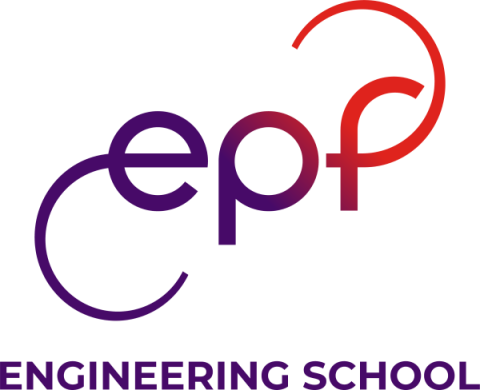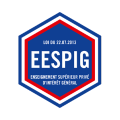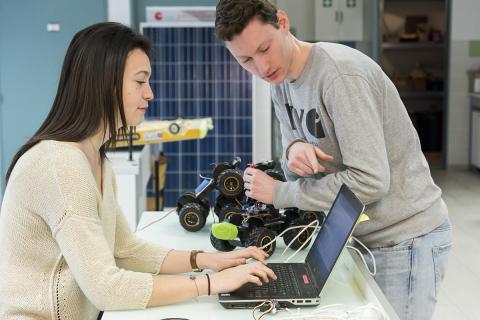
Inclusive and socially
committed campuses
committed campuses
EPF has always valued diversity as a source of wealth at the heart of student life, long before it became a societal issue.
Founded in 1925, the Polytechnic School for Women (EPF) was for a long time one of the few grandes écoles to train women in engineering, and the only one to have graduated so many: over 7,000! The EPF has been a recognised non-profit foundation since 1991 and became co-educational in 1994. Despite no longer using its acronym, today almost 36% of its students are female, compared to an average of 17% in other engineering schools. The school continues to promote the engineering profession among women by working specifically with female high school and university students, and through various partnerships, including with the Elles bougent association.
The school is also committed to:
- Geographical openness: with three campuses spread across France (Paris-Cachan, Troyes, Montpellier), EPF is open to students from all over the country. Although deeply attached to its local roots, the school is continuing its development with the forthcoming opening of a new campus in Saint-Nazaire, which will be the first campus in the west of France.
- Diversity of courses and admissions: EPF is committed to providing access to engineering schools to as many people as possible. The school is opening its doors to students and now also offers apprenticeships. Students can also join the school as part of a parallel admissions process - for example, after two or three years of university studies.
- Personalised and adapted support for students with disabilities: provision of educational facilities and/or materials and support for students throughout their degree, provided by disability advisers on each campus.
This open-mindedness is part of the school’s DNA, which is also committed to a sustainable development and social responsibility initiative (as the first engineering school to have joined the United Nations Global Compact). We pass on these values to our students, while also providing them with a solid scientific and technical background.
EPF training ensures that students are taught a culture of commitment and responsibility, with the aim of producing cultured engineers who are open to the world and able to understand the changes and challenges in our society, in their cultural, educational, and behavioural differences.
To fast track its educational innovation and sustainable development initiative, EPF has added ‘civic engagement’ to its competency framework, and is working with Impact Campus to develop its civic engagement pathway.
All second-year students take discovery modules concerning Social Entrepreneurship, Sustainable Development Goals or the Ecological and Inclusive Transition. There is a mandatory civic engagement work placement (volunteering, aid, CSR department) between the second and third year. The aim of this placement is to develop the questioning mind of a committed citizen that EPF engineers must demonstrate.
EPF entered into the United Nations Global Compact in favour of respecting the fundamental values in its operation. Every signatory must commit to upholding ten principles concerning human rights, labour standards, the environment, and the fight against corruption. The EPF is therefore committed to applying these principles in its strategy and its work.
A commitment to humanity and the environment
The EPF is dedicated to raising awareness and working towards sustainable development and social responsibility. A sustainable development unit involving all EPF stakeholders implements actions and engages with projects, with the goal of achieving ecological and responsible campuses. The EPF has in fact been recognised for its environmental initiatives, and has been awarded the ‘AGIR ENSEMBLE’ label (WORK TOGETHER), which seeks to promote local actions contributing to the development of sustainable campuses within sustainable territories.
The EPF lists more than 50 student organisations on its three campuses and is proud to count among them EPF Partage, Helphi, Egaliphi, EcoloPhi, EcoTrip and 1 Pour Tous, six humanitarian, solidarity, ecological and campaign associations.
Challenge 24H Innov’ Handicap
Each year, EPF organizes the "24H Innov’ Handicap Challenge" with the support of partner companies, associations, and institutions.
Fourth-year EPF students work for an entire day on one of the proposed themes related to disability, with the assistance of experts from partner companies and associations specializing in the field of disability.
Objective: Propose innovative solutions to make daily life easier for people with disabilities and raise awareness among engineering students about accessibility issues for all.
Three Campuses, 500 Engineering Students!
From analyzing the context and needs to prototyping a product, each group must conceive a technological innovation on a theme of their choice, selected from those presented to them on the day of the event.
Divided into teams of 8 to 10 members, students will need to demonstrate creativity, responsiveness, adaptability, and teamwork to convince the judges.
Students from the Troyes campus travel to the Paris-Cachan campus to participate in the challenge.
Coaches and Experts to Support and Evaluate Projects
Experts in project management, mobility, ergonomics, disability, digital technologies, innovation, and financial structuring will be available throughout the day to coach students and guide groups in their projects.
At the end of the day, groups will present their projects in a 10-minute pitch (including a presentation, video, and prototype demonstration) before a jury.
The juries, composed of experts in accessibility, disability, recruitment, and new technologies, will evaluate the originality, technological innovation, coherence, and feasibility of the projects.
Workshops will also be offered to students, such as braille poker, blindfolded tasting (with or without smell), and blind football. These activities aim to place engineering students in situations of disability and stimulate their creativity and innovation capacity.
"Through this unique challenge, EPF is innovating to address one of the major challenges of our society: accessibility for all. I hope other engineering schools join us in meeting this challenge of putting science and innovation at the service of disability," explains Emmanuel Duflos, General Director of EPF.
Support & Advocacy: A Disability Mission at the Core of the School
EPF has always been committed to disability-related issues. The school already had a dedicated representative on each of its campuses and organized annual awareness and support events.
Since September, EPF has taken this further by creating a Disability Committee led by Thomas Provot, a research professor, and Ophélie Kwasnieski, an academic coordinator.
Through this new dedicated unit, EPF aims to undertake broader initiatives in supporting students with disabilities, continue raising awareness among future engineers, and strengthen relationships with companies on this topic.
Supporting Students in All Aspects
The primary goal of establishing the committee is to provide the best possible support to students with disabilities throughout their time at EPF, both in educational and practical matters. This responsibility falls to Ophélie Kwasnieski, who manages student relations and their year-round support.
"The existence of this unit is essential to ensure the best possible academic experience for our students with disabilities. They need someone they can turn to throughout their studies at EPF, someone to welcome and guide them through their processes. I see my role as a bridge between the school and the students. Beyond informing them, sometimes we need to implement specific accommodations or provide support for their professional integration."
– Ophélie Kwasnieski, Disability Coordinator and Academic Advisor
Making Companies Allies in Supporting Disability
In addition to supporting students, Thomas Provot aims to maintain a strong connection with companies already involved in school events.
Continuing to develop industrial partnerships allows EPF to collaborate with professionals working on disability-related projects, secure financial aid for students, and gain support for dedicated events. Companies also contribute to raising awareness and provide internships and job opportunities for students with disabilities.
"All permanent staff are involved in addressing disability – we are all stakeholders: general services, student life, international relations, corporate relations, and more. With the creation of a broader unit entirely dedicated to this, we have the opportunity to centralize information, conduct coordinated actions, and develop new missions in both support and awareness. Building connections with companies is crucial, especially for professional integration."
– Thomas Provot, Research Professor and Disability Coordinator
Raising Awareness Among All Students and Staff
Raising awareness among all students about disability issues is part of the school's mission to train responsible and committed engineers.
The Disability Committee will continue its communication efforts, including the 24H Innov’ Handicap Challenge, educational activities, projects focused on disability, and research initiatives.
Contact

A Legacy of Inclusion and Responsibility: EPF's Commitment to a Safer Community
Since 1925, EPF has been a pioneer in education, becoming the first all-women engineering school in France. Today, with 35% of its graduates being women, the school continues to uphold its history of inclusion, responsibility, and progressive values. EPF is dedicated to fostering personal growth and empowerment in an environment where every individual is respected and valued.
Our commitment goes beyond academics. EPF actively works to create a safe and supportive environment across all campuses. To further this mission, the school has developed a concrete action plan to address and prevent sexist, sexual, LGBTQIA+phobic violence, and all forms of harassment. Through year-round training sessions and awareness-raising events, we aim to educate and empower our community to stand against these issues.
If You Need Help, Speak Up—We’re Here for You
Experiencing or witnessing harassment or violence can feel overwhelming, but when you're ready, there are people ready to listen and help. At EPF, specially trained harassment and sexual violence advisors are available to provide confidential support, guidance, and resources. You can speak freely, knowing that your concerns will be handled with care and sensitivity.
Outside of EPF, additional support is available through the French government’s dedicated platform, www.arretonslesviolences.gouv.fr. This website offers valuable information, access to an online chat with qualified professionals, and contact details for supportive organizations. Taking that first step may feel daunting, but it can make all the difference—whether it is for your own well-being or to help someone else.
Together, we can create a culture of respect, safety, and solidarity at EPF and beyond.
For more information, please visit
La Loi pour la liberté de choisir son avenir professionnel, votée le 1er août 2018, intègre l’obligation pour les entreprises de publier un index pour l’égalité femmes-hommes mesurant entre autres les écarts de rémunération entre femmes et hommes au sein des entreprises.
L’index de l’égalité femmes-hommes de l’EPF est de 91 points sur 100 au titre de l’année 2024.
Cet index prend en compte 4 critères calculés sur 100 points :
- Ecarts de rémunérations entre les femmes et les hommes : 36/40 points
- Ecarts de taux augmentations individuelles (hors promotions) entre les femmes et les hommes : 35/35 points
- % de salariées revenues de congé maternité et ayant bénéficié d’une augmentation à leur retour : 15/15 points
- Nb de salariés du sexe sous-représenté parmi les 10 plus hautes rémunérations : 5/10 points
Le résultat de l’index de l’égalité femmes-hommes au sein de l’EPF démontre la volonté de notre école de mettre en place des actions concrètes en faveur de l’égalité entre les femmes et les hommes.
L’EPF est soucieuse d’offrir à ses collaborateurs un cadre de travail bienveillant et inclusif dans lequel chacun(e) puisse s'épanouir, apporter ses différences et donner le meilleur de soi-même (quels que soient son sexe, son âge, son origine ou encore son handicap).











